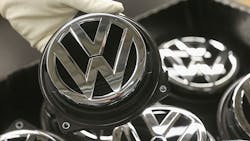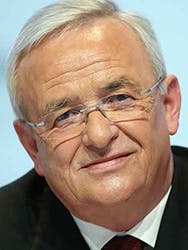VW Ordered to Face US Investor Suit over Diesel Cheating
Volkswagen AG (IW 1000/8) must face claims it misled U.S. investors after installing so-called defeat devices in diesel vehicles used to cheat emissions tests.
A San Francisco federal judge also rejected a request to dismiss shareholder claims against former VW Chairman Martin Winterkorn, who said investors in VW’s American depositary receipts couldn’t prove he knew the extent of the company’s “diesel issue.”
The company contended the judge didn’t have jurisdiction to hear the dispute, saying any wrongdoing occurred outside the U.S. The argument was rejected by U.S District Judge Charles Breyer.
“While much of defendants’ alleged fraudulent scheme was perpetrated in and from Germany, the court cannot conclude, as defendants urge, that no relevant conduct occurred in the U.S.,” Breyer said in his order Wednesday. “The court concludes that plaintiffs, who are U.S. residents and bring claims based on U.S. securities laws, are entitled to considerable deference to their forum choice.”
Shares of VW’s most commonly traded ADR plummeted 25% in the week after the scandal broke on Sept. 18, 2015, to $27.16 in New York trading. Shares have fallen 20% in the almost 16 months since the allegations were made public.
Although total damages in the suit remain unknown, they’re likely to pale in comparison to theoretical shareholder damages in Germany alleged to surpass $9 billion, according to Bloomberg Intelligence.
VW spokeswoman Jeannine Ginivan didn’t immediately respond to phone and e-mail messages seeking comment on the ruling.
Winterkorn's Travel
Lawyers for investors contend the company and Winterkorn were well aware of the fraud in Germany. Winterkorn traveled to the U.S. to promote the company while neglecting to mention the defeat devices, they said.
The case could be one of the final pieces of litigation before the German carmaker in the U.S. The company has already committed to spending almost $20 billion to settle complaints by car owners, dealerships and the government in the U.S. and Canada.
VW’s agreement to resolve claims over 480,000 cars in the U.S. with 2.0-liter engines was approved by Breyer in October. The company has reached a preliminary accord to settle claims involving 83,000 VW, Porsche and Audi diesel vehicles with 3.0-liter engines.
The company still faces investor and consumer lawsuits in Germany, along with criminal investigations there and in the U.S. A regional German court on Wednesday ordered VW to replace one customer’s polluting car, dealing a setback to the company’s plan to minimize compensation to Europeans affected by the diesel emissions scandal. The case is the first of its kind in the carmaker’s home country.
By Kartikay Mehrotra and Margaret Cronin Fisk
About the Author
Bloomberg
Licensed content from Bloomberg, copyright 2016.

